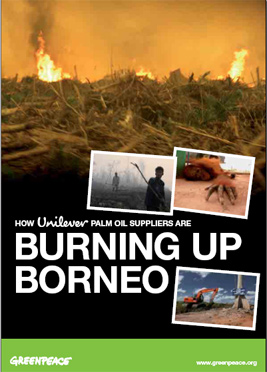Unilever admits it can’t trace origin of palm oil used in its products
Unilever admits it can’t trace origin of palm oil used in its products
mongabay.com
April 21, 2008
|
|
Unilever has admitted to Greenpeace that it can’t trace the origin of palm oil supplied by firms operating in Indonesia. The revelation suggests that efforts to improve the sustainability of Indonesian palm oil have stalled as large tracts of rainforest continue to fall for the establishment of new oil palm plantations on the islands of Borneo, New Guinea, and Sumatra.
“Unilever acknowledges that it has no idea where about 20% of its palm oil comes from,” states Greenpeace in a new report on palm oil production in Kalimantan, the Indonesian part of Borneo. “Of the remaining 80%, it knows the group supplying the palm oil, but not necessarily the concession areas from which it originates.”
“Unilever pretends to be a responsible company, but what it’s really responsible for is profiting from rainforest destruction,” Tim Birch, Greenpeace International forests campaigner, said. “If they invested as much in sorting out their suppliers as they do on greenwashing their brand, they could fix this problem for good.”
Burning Up Borneo
Through analysis of maps, satellite data, and on-the-ground investigations between February and April 2008, Greenpeace links the majority of the largest palm oil producers in Indonesia to Unilever, one of the world’s biggest food and cosmetic companies.
The environmental group takes Unilever to task for its apparent failure to live up to sustianability commitments set forth under the Roundtable on Sustainable Palm Oil (RSPO), an industry push to improve the environmental performance of palm oil producers.
“Unilever has failed to use its power to lead the palm oil sector toward sustainability, either through its own palm oil purchasing — its primary suppliers in Indonesia represent over a third of the country’s palm oil production — or through its role as leader of the Roundtable on Sustainable Palm Oil (RSPO), whose members represent 40% of global palm oil production,” states the report. “As Greenpeace investigations show, this expansion into the Indonesian territory of the island of Borneo has in large part been led by companies who are Unilever suppliers and RSPO members.”
“This expansion — often illegal and in breach of RSPO principles and criteria — is not only bad for wildlife, it is also bad for the climate and bad for governance,” the report continues. “By failing to apply and enforce RSPO principles and criteria to both traders and producers at group level, Unilever has failed to bring the rapidly expanding palm oil sector under control.”
The report recommends an immediate moratorium on oil palm expansion into rainforest and peatland areas.
The Greenpeace report: How Unilever Palm Oil Suppliers are Burning Up Borneo,
